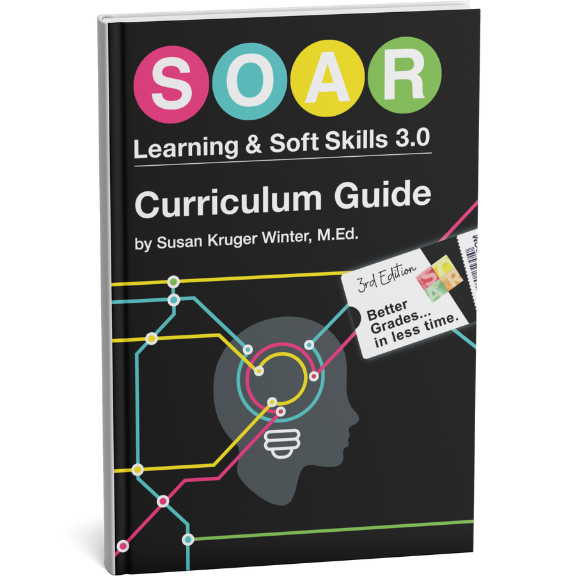The Cost of NOT Teaching Study Skills
As school budgets are rapidly shrinking, administrators have to carefully consider how to allocate their budget; they need to get the most “bang for their buck.” Managing a school budget is an art form involving hundreds of decisions and balancing dozens of demands.
“How Can We Make the Greatest Impact?”
This question is usually the first consideration and a logical place to start. To answer this question, we must consider the final objective. Most people agree that the purpose of education is to help young people develop the skills they need to be independent, self-sufficient members of society. Of course, we also hope to arm them with skills for achieving their own sense of personal happiness and success.
How do we do that?
We can look at what employers need. In 2008, a large survey of employers in “emerging sectors” were asked what skills they needed most from their employees…now, and in the future. These employers represented fields that are expected to grow significantly in the next 30 years, such as healthcare and technology.
Of the top 57 skills they listed, only 4 related to technology. The remaining skills were things like:
- Reading comprehension
- Critical thinking
- Active learning
- Written expression
- Time management
- Organization
- Active listening
- Attention to detail
- Learning strategies
- Independence
…these are “soft skills” and they represent 95% of the top skills in the workplace!
The importance of “soft skills” are further supported by a study from the Stanford Research Institute and Carnegie Mellon Foundation. After surveying 500 CEOs, they determined that 75% of long-term career success depends on soft skills, while only 25% percent depends on technical knowledge.
What, Exactly, Are “Soft Skills?”
Soft skills are the skills needed to be a life-long learner, think critically, and make decisions independently. The skills needed to communicate effectively. They are the skills needed for a global economy!
No matter how much more “advanced” our society gets, soft skills will always be the key to success because they allow people to effectively learn the “hard skills,” or technical information, as jobs evolve.
Yet, they are largely ignored in education! I just did an internet search on “soft skills.” I combed through the first 60 results before I found one link to any type of educational institution that is addressing “soft skills” in their curriculum…and it was a community college! (Delaware Tech & Community College, if you are wondering.)
The first 59 links were mostly newspaper and magazine articles about how desperate the workplace is for these skills. You don’t have to look far to see there is a great divide between the content schools are teaching and the skills needed to stay competitive in the 21st century.
We have already lost millions of jobs to other countries and the hemorrhaging will continue if we cannot right the ship. As a parent, I am arming my children with these skills because it is clear they are the key to their future success. I am personally frustrated that they do not learn how to learn, process information, or have an opportunity to exercise their critical thinking skills in school.
Education statistics support this concern:
- 30% of US High School students drop out of school.
- 40% of US college students must take at least one remedial course.
- 50% of US college students drop out before completing a degree.
- 66% of US high school honor students fall behind in college.
Do “Soft Skills” Make a Difference in School?
“Soft skills” are synonymous with “study skills” (both categories address all of the skills listed above) and research shows that study skills have a big impact on school performance!
In April, 2009, Ohio State University published a study confirming the dramatic impact study skills can have on college graduation rates. According to the study:
45% – the increased likelihood that “struggling” high school students would graduate from college if they took a study skills class.
600% – the increased likelihood that “average” high school students would graduate from college if they took a study skills class!
Imagine the impact these skills would have on students if they could learn them earlier than college? Imagine what these skills will do for these students after college?
The Cost of Teaching Everything Else
Where can you make the most impact with your time and money? Will it be in one subject area that is narrowly focused? Or, will it be on teaching skills that impact all subject areas, improve student performance, and actually prepare them for the workplace?
The average cost per student to teach a core subject* is $81.75. The average cost per student to teach study skills is $16.99.
It is 79% LESS EXPENSIVE to teach Study Skills…and they apply across ALL content areas!
*Average cost per student is based on an average of student texts from three major publishing companies. Details are available at the page below.
The Cost of Not Teaching Study Skills Video
If you would prefer, you can also access this information in video format here:
-Susan Kruger
JS110218
Six Steps
Conquer the Chaos
Get Our Free Guide & Information on...

"*" indicates required fields
Get Our FREE Curriculum Guide!
The SOAR® Curriculum
The most critical learning, organizing, and communication skills needed for school. Learn more here.
Who’s Using SOAR®?
SOAR® Guarantee
Click here to learn more.




